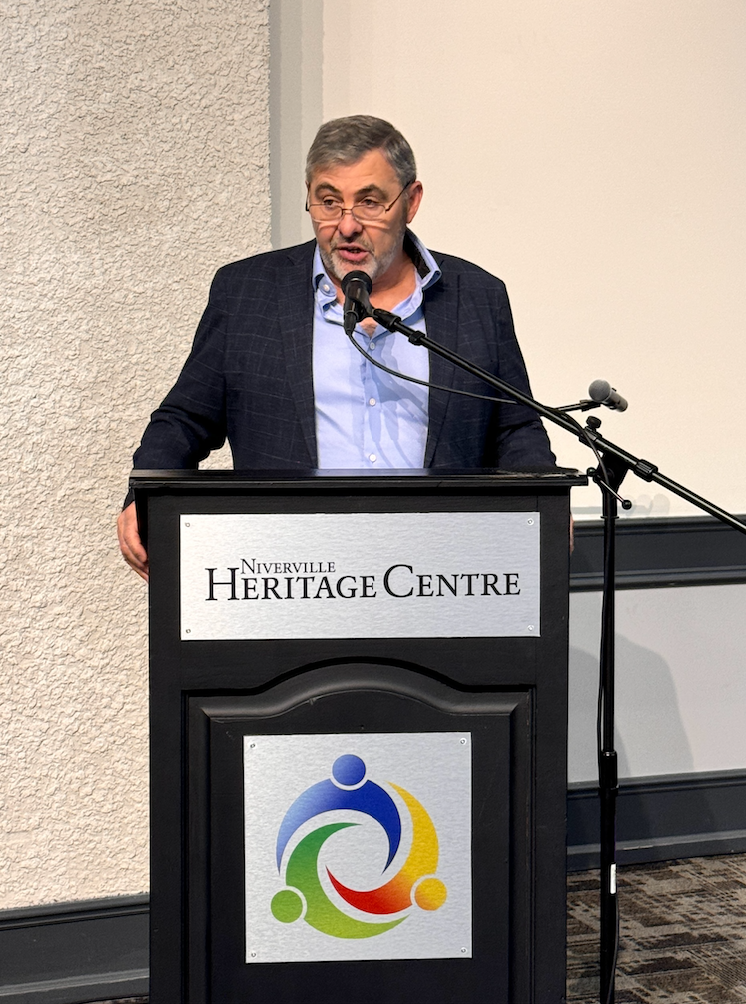
Rick Préjet, a hog producer from Notre Dame de Lourdes, MB, and chair of the Manitoba Pork Council, addressed producers during the MPC meeting in Niverville, MB. Highlighting Manitoba’s leadership in the hog sector, Préjet emphasized the importance of maintaining a strong national presence and fostering international relationships, particularly with U.S. producers and governments in states like Idaho and Minnesota. “Nobody’s going to speak for us,” he stated. “We’re a big producer and exporter as a province, so we need a strong voice.”
Préjet also pointed to Manitoba’s leadership in initiatives like the PED (Porcine Epidemic Diarrhea) elimination plan, which has become a model for other regions, and Manitoba’s active role in Emergency Support Function (ESF) planning. These efforts underscore the province’s commitment to driving innovation and collaboration in the industry.
The MP chair emphasized the importance of proactive engagement. “We know it’s going to affect all of us, but we also know we need to be very active in that area.” He highlighted the critical role of Manitoba Pork’s staff, who work tirelessly to represent the province in various communities. Préjet underscored the ongoing efforts in African Swine Fever (ASF) planning and collaboration with governments to prepare for potential outbreaks and their impact on trade relations. “We’re committed to staying ahead and ensuring total preparation for anything that may happen.”
Préjet emphasized the importance of building and maintaining public trust, noting, “We can promote the product, but we’re not necessarily going to move the needle in selling an extra pork chop or directly affecting the price. It’s about something bigger.”
He highlighted the need to foster understanding and confidence in the pork industry.
“When people want to build a barn or make renovations, we need the public to know who we are, what the industry stands for, and the benefits it brings.”
Manitoba Pork remains committed to informing the public and strengthening trust to ensure sustainable community growth and acceptance.
Préjet highlighted group housing as a key topic of discussion within the industry. “It’s a big topic, and many people are talking about it,” he remarked, referencing a recent forum that brought producers together to share their experiences and approaches to group housing. While future forums are not yet confirmed, Préjet emphasized Manitoba Pork’s active role in supporting producers during the transition.
“We’re heavily engaged at Manitoba Pork to try to make that transition as smooth as possible,” he explained. He encouraged producers to explore all available systems and tap into the resources provided, including printed materials, board members, and the shared knowledge of fellow producers. “We’re delighted with the group housing systems we’ve seen, but we know it’s going to come down to dollars and cents for many producers,” Préjet acknowledged. Manitoba Pork remains committed to offering support and information to help producers navigate this significant challenge.

Cam Dahl, General Manager for Manitoba Pork, reflected on a recent trip to Ottawa for discussions with Animal Health Canada, emphasizing the progress made in African Swine Fever (ASF) preparedness. “We’re, of course, doing a lot of planning with them for ASF. They’re kind of the national umbrella for ASF planning,” he explained.
Dahl expressed confidence in the direction of the efforts and the funds invested, stating, “We’ve made a lot of progress, even just in ensuring that the communications pathways are open and on things like zoning agreements. The risk of a protracted disruption in trade because of ASF is much lower than it was even five years ago.”
He highlighted specific advancements, such as collaborative efforts with trading partners like the U.S. and Japan to secure recognition of zoning protocols established by the Canadian Food Inspection Agency (CFIA). “The work with our trading partners on getting the U.S. to recognize the zones that the CFIA will be setting up, and similar work with Japan, gives us more comfort,” Dahl noted.
Manitoba Pork has also partnered with Manitoba Agriculture to develop an integrated emergency response plan, addressing critical issues like depopulation strategies in the event of ASF. “Much progress has been made, from communications between the CFIA and producers to coordinated response planning with the government of Manitoba,” Dahl concluded, underscoring the sector’s commitment to preparedness. •
— By Harry Siemens





